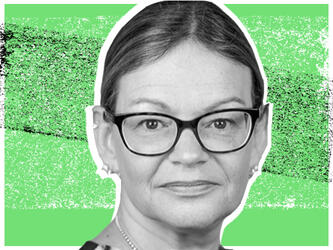The other side of Davos

Some claim, not unreasonably, that the CEOs and politicians in Davos – flown in by 1,500 private jets and helicopters to debate how we should reduce our carbon footprints – experience reality second-hand. But this is precisely why the annual World Economic Forum still takes place in Europe’s highest town: it is so inaccessible to the general public that the global elite can do novel things once a year, like walk down a street.
That said, Davos has its own class system, with the colour of your badge determining the events you can visit – and even which of the streets you are permitted to walk along.
One suspects, then, that this may not be the ideal venue to discuss the disruptive forces of populism, inequality, job insecurity, and the sense that unrestrained capitalism needs to be reined in. On the main stage, the panels arranged for Davos’s upper classes often manage to agree simultaneously that we all must do something, while rejecting anything that would reduce their personal wealth or the profitability of their businesses.
For example, Michael Dell – net worth $26bn and the chief executive of the company that bears his name – was asked whether he agreed with the suggestion that the highest marginal rate of income tax should be 70% – a plan supported in a survey by almost half of Americans (three in four Americans support some level of higher taxes for the rich – see panel, below). “I don’t think it will help the growth of the US economy,” he said. “Name a country where that’s worked?” Sitting next to him, Erik Brynjolfsson, a professor of economics at MIT, pointed out that – until comparatively recently – it had worked rather well in the US.
This ‘Old Davos’ elitism captures the headlines, but the World Economic Forum has a less-reported fringe, in which more practical and imaginative ideas are discussed in detail in smaller venues. No-one could claim that the attendees at Davos are diverse or representative (only 22% of them are women, for example) but – away from the main stage – the Forum now offers a wide range of perspectives and ideas.
Ordinary people
Many sessions are built around the need to listen and respond to the changing opinions of ordinary people, whether they are citizens or customers. One of the more ambitious examples is 172-year-old Philip Morris International (PMI), best known as the manufacturer of Marlboro cigarettes, but now betting its business on e-cigarettes instead.
PMI is officially ‘working for a smoke-free future’, actively telling its customers not to smoke – or, if they want to consume nicotine, to use safer e-cigarettes instead. Among many changes, the company is now committed to transparency – for example, publishing all its biological research.
Forecast trends
Marian Salzman, senior vice-president of communications, explained that PMI had recruited staff to monitor social media 24 hours a day and debate with the public, one by one, about the comparative merits of vaping. On the one hand, this is because PMI cannot advertise in most countries, so it has trouble persuading smokers to change their point of view. On the other, “[marketing] is a dialogue, not a monologue as it once was,” Salzman said. “Our whole point of view is not to tell people what to think – it is to hear what they think and then for us to incorporate it.”
An uncertain future caused many sessions to focus on innovations to forecast trends. Robert Kirkpatrick, the director of UN Global Pulse (UNGP), has been discovering how to use commercial data to learn more about the world. For example, getting access to the top-up data for Rwanda’s mobile phone users has allowed UNGP to predict local food shortages with 89% accuracy, he explained.
Additionally, a 10-person team uses social media sentiment analysis to map the location of hate speech in mainland Europe, with the research helping to manage risk for refugees migrating through the continent.
WorldQuant, an investment management firm, has become so sophisticated in its use of big data for trend analysis in financial markets that it is launching a project to apply the techniques in areas such as healthcare, using data from 1,000 data sets.
The idea is to apply its expertise in machine learning to better predict the impacts of social policy or innovation. However, founder and chief executive Igor Tulchinsky said commercial success and the public good require different standards of certainty, and less tolerance of risk. “In finance, if you’re right 50.1% of the time, you’re ahead”. As a result, extending predictive technologies from wealth creation to curing cancer will not be an easy leap.
Disruption has also affected Sir Martin Sorrell – formerly chief executive of WPP, but now of S4 Capital – who gave his interview in a local church after ascending from its crypt. Arguing that the future of advertising will be microtargeted “assets at scale”, he explained how one of his clients had created a campaign with more than a million possible executions using artificial intelligence (AI). Sir Martin’s message is microtargeted too these days, however: he delivered it to an audience of 19.
Loosening their ties
In uncertain times, a surprising number of Davos delegates were willing to tune in to new ideas, occasionally loosening their ties to do so. On one side of the road, there was a packed ‘New Davos’ crowd to see Mother Ocean (‘author, evolutionist, founder and spiritual director’) workshopping with entrepreneurs on ‘the power of heart intelligence’.
I crossed the carriageway to join the sparse audience that was listening, respectfully, to a panel of macro-economists debate policy options for the European Central Bank. It was a decision I instantly regretted, because it’s the sort of sterile discussion that has been going on for decades.
The odder ideas in ‘New Davos’ might seem ambitious, uncertain and even crazy, but perhaps they are the appropriate ones for the world economy in 2019.

We hope you enjoyed this article.
Research Live is published by MRS.
The Market Research Society (MRS) exists to promote and protect the research sector, showcasing how research delivers impact for businesses and government.
Members of MRS enjoy many benefits including tailoured policy guidance, discounts on training and conferences, and access to member-only content.
For example, there's an archive of winning case studies from over a decade of MRS Awards.
Find out more about the benefits of joining MRS here.












0 Comments